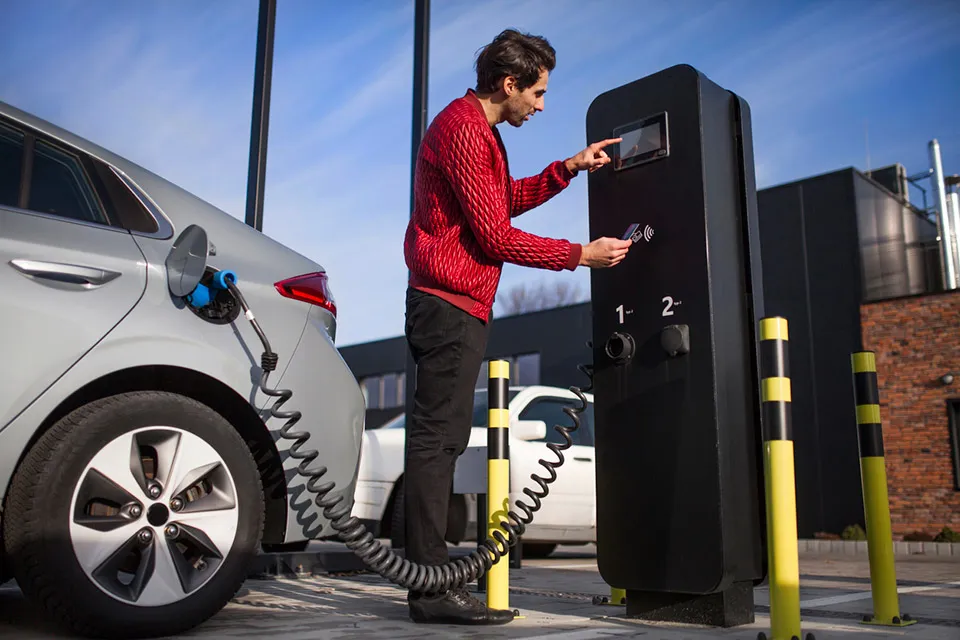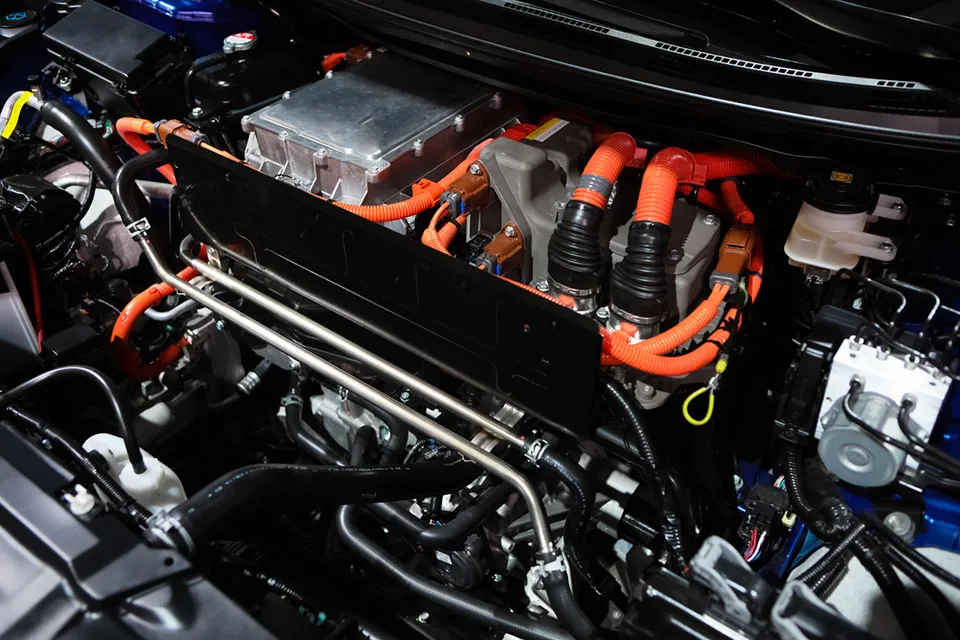- What Does It Really Cost to Own an Electric Car?
- The EV Revolution
- Understanding Upfront Costs for Electric Vehicles
- How Much Money Do You Save With An Electric Car?
- EV Maintenance Costs vs Gas
- Electric Car Charging Costs
- Overview of EV Total Cost of Ownership
- GoodCar's Thoughts on The EV Revolution
What Does It Really Cost to Own an Electric Car?

Going electric is an increasingly popular option for cars, with more and more people turning to the eco-friendly option as an alternative to gas-powered vehicles. But what does it really cost to own an electric car? So, let's explore the true cost of owning and maintaining an electric vehicle and break down how much you can expect to pay in total. Hopefully, we can help determine if going electric is right for your budget.
The EV Revolution
Electric cars are becoming increasingly popular as consumers look for more sustainable and environmentally friendly modes of transportation. But what does it really cost to own an electric car?
There are a few different factors to consider when determining electric car costs. First, there is the initial purchase price of the car itself. Electric cars tend to be more expensive than their gasoline-powered counterparts, so this is something to remember when budgeting for your new vehicle.
In addition to the purchase price, ongoing costs are associated with owning an electric car. These include charging station installation and EV maintenance costs, electricity costs, and potential range anxiety (the fear of running out of charge while on the road).
Considering these factors, owning an electric car can be quite affordable. And as battery technology continues to improve, electric vehicles will only become cheaper and more convenient to own as time moves forward.
Understanding Upfront Costs for Electric Vehicles
The upfront cost of an electric vehicle is higher than that of a traditional vehicle. Still, there are federal and state incentives available that can help offset this cost. The federal government offers a $7,500 tax credit for electric vehicles, and many states offer additional incentives. These incentives can help make owning an electric car more affordable.
Incentives For Electric Vehicles
HOV Lane Access:
- Some regions allow EVs to use high-occupancy vehicle (HOV) lanes, even with a single occupant, which can save time during commutes.
Free or Discounted Parking:
- Certain cities offer free or reduced-rate parking for EVs, encouraging their use in urban areas.
Charging Infrastructure Incentives:
-
Grants and rebates for installing home or workplace charging stations.
-
Public charging infrastructure development funded by local governments or utilities.
Utility Rate Discounts:
- Some utility companies offer reduced electricity rates for EV owners, especially for off-peak charging.
Reduced Registration Fees:
- Lower or waived vehicle registration fees for EVs compared to traditional internal combustion engine vehicles.
Trade-in Bonuses:
- Some programs offer additional bonuses for trading in an older, less efficient vehicle when purchasing a new EV.
How Much Money Do You Save With An Electric Car?
Owning an electric car is often cheaper in the long run than owning a gas car. With gas prices always fluctuating, budgeting your monthly gas expenses can be hard. Electric cars are much cheaper to operate since you only need to charge them up rather than constantly buying gas. In addition, electric cars require less maintenance than gas cars, so you'll save money there as well.
Electricity vs. Gasoline: Charging an EV generally costs less than refueling a gasoline car. For example, if electricity costs $0.13 per kWh and an EV consumes 30 kWh to travel 100 miles, the cost is about $3.90 per 100 miles. In contrast, if gasoline costs $3.00 per gallon and a gasoline car gets 25 miles per gallon, the cost is $12.00 per 100 miles.
Annual Savings: For someone driving 12,000 miles per year, the annual savings could be substantial. Using the example above, the EV would cost about $468 per year to charge, while the gasoline car would cost about $1,440, leading to savings of around $972 per year.
EV Maintenance Costs vs Gas

Electric cars require less maintenance than gasoline cars and often have lower repair costs. The initial cost of an electric car may be higher, but over time they are cheaper to own and operate. However, some of the most common maintenance and repair costs associated with EV vehicles that you will likely experience will leave you with a little bit of sticker shock.
The cost of servicing an electric car battery is typically higher than that of a gasoline engine. Battery replacement is the most expensive repair cost associated with electric cars, usually costing between $4,000 to $18,000, depending on the make and model of the vehicle. Replacing a motor or other major component in an electric car can also be costly, with some parts running up to $5,000 or more.
Electric car repair costs will vary depending on the type of maintenance needed. Regular maintenance such as oil changes, tire rotations, brake repairs, and even interior detailing are often cheaper for electric cars than their gasoline counterparts. Many electric cars use regenerative braking systems, which help reduce wear and tear on brake pads and rotors. You may also see savings when it comes to spark plug replacement or air filter changes since these components are not used in electric cars, which is where EV vehicles can make up a lot of ground regarding long-term EV maintenance costs and savings.
Overall, operating costs for electric cars tend to be lower than those for gas-powered vehicles due to reduced repair and servicing costs over time. Electric cars are generally easier to maintain since there are fewer moving parts than traditional vehicles, making it simpler and cheaper to perform simple repairs or tune-ups when needed.
Electric Car Charging Costs
Electric vehicles are often lauded for being cheaper to operate than traditional gas-powered cars. But what does it really cost to charge an electric car?
The cost of charging an electric car depends on a few factors, including the price of electricity, the car's battery size, and the local climate. However, as we saw in Q4 of 2022, the rising electricity and stabilized gas prices have thrown the idea of electric vehicles being cheaper to operate out the window. It is also dependent on a question too many people forget to ask; how long does it take to charge an electric car at a charging station, and is it faster to do it at home? As a result, charging (which is necessary for electric vehicles) can easily become one of the hidden costs of owning an electric car.
When comparing mid-sized gasoline-powered vehicles to their EV counterparts, it was found that gasoline owners paid roughly 30 cents less per 100 miles driven than those who charged their vehicles at home and saved more than $3.00 per 100 miles than those who charged at charging stations. This is why paying attention to energy costs before jumping in feet first is important.
Overview of EV Total Cost of Ownership

The total cost of ownership (TCO) of an electric car includes the following:
- The purchase price.
- Fuel costs.
- Maintenance and repair costs.
- Other ownership costs like insurance and taxes.
Electric cars are often more expensive to purchase than traditional gasoline cars. However, electric cars have become cheaper to own and maintain over time. Electric cars also have other ownership benefits like lower insurance rates and access to HOV lanes.
GoodCar's Thoughts on The EV Revolution
With various models and options, owning an electric car can be very cost-effective and efficient. Though it may require some upfront investment, there are several ways to save money on charging fees over time. Additionally, with the various government incentives offered worldwide, it's becoming increasingly easy for people to take advantage of these subsidies and make owning an electric car a more economy-friendly option. If you're looking for an environmentally friendly mode of transportation to help reduce your carbon footprint, then taking a closer look at electric cars is highly recommended. If you are in the marketing for a used EV, look into the GoodCar Vehicle History reports to ensure you don't get taken for a ride!
- What Does It Really Cost to Own an Electric Car?
- The EV Revolution
- Understanding Upfront Costs for Electric Vehicles
- How Much Money Do You Save With An Electric Car?
- EV Maintenance Costs vs Gas
- Electric Car Charging Costs
- Overview of EV Total Cost of Ownership
- GoodCar's Thoughts on The EV Revolution
FREE Vehicle Search
- Accidents
- Problem Checks
- Title Records
- Recalls
- Values
- Specs
-
InfoPay, Inc. (dba GoodCar) is an Approved NMVTIS Data Provider
-
-























